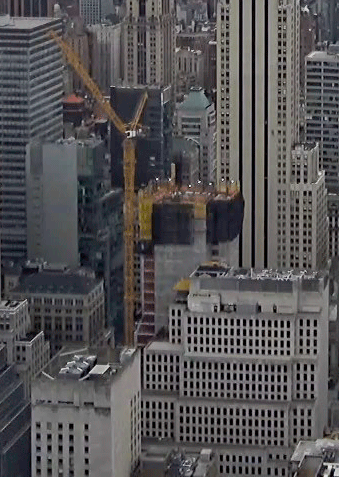I noticed these lights pulsing today on Earthcam. I’ve never seen this before on a building under construction. Does anyone have any insight?

I noticed these lights pulsing today on Earthcam. I’ve never seen this before on a building under construction. Does anyone have any insight?

Mating call?
I have a feeling this will look great up close, but won’t look as good from further away. One Vanderbilt has the opposite issue in my opinion.
I guess they are just construction lights. Just seems like more than usual on this building.
From today
Such a quality design. Interesting to see that they drew inspiration from Hugh Ferriss’ visions. To me, it also invokes elements of New Formalism a la Lincoln Center.
AKA Hollywood Regency.
Hopefully this will be high enough in the summer when the sunsets align more with the Manhattan grid. I bet those upper floors will look amazing with that last light from Weehawken. It will be wedged between 1VB and MetLife.
Edit: here’s a pic of what I’m describing. Looks like the Paramount Building will also be in frame.
I dont see why it wouldn’t, it’d be at or around the level of the Summit Levitation glass lookouts.
Oh yeah that will be a very nice glowing facade shot along with 270 Park. Always trying to plan for our best light source, the sun lol.
I kind of wish it had more of a crown on top but I like the massing.
This work of ‘modern architecture’ has all the aesthetic appeal, and subtle beauty of ‘classical architecture’.
There need not be any deep disagreement between the fans of ‘Modernism’ and ‘Classicism’ - they BOTH can be equally beautiful. ![]()
BTW- Interesting conversation here on modernist architecture.
I don’t think this building is “modernist”. Modernism prioritizes minimalism, the expression of structure, and of course the “form-follows-function” mantra. Modernism also usually conceptualizes buildings as standalone objects instead of parts of an urban context. 520 Fifth’s facade panels, while beautiful, are fundamentally ornamental and contextual which I think precludes this from being classified as modernist.
In my opinion, these new towers that combine historical/contextual motifs with modern design like 520 Fifth, Brooklyn Tower, Steinway, etc are actually descended from the postmodern architecture movement of the 80s. The postmodernists wanted to reintroduce urban context, ornamentation, and historical references to architecture which they felt was too dominated by modernist, functionalist dogma. It started as a radical fringe in architecture but eventually became the dominant corporate style of the 80s with architects like Cesar Pelli, Helmut Jahn, and early KPF designing huge towers in a postmodern style.
PoMo went out of style as quickly as it came. It has a bit of a bad reputation in the world of academic architecture because it’s associated with 80s corporate excess. But I think it’s more influential on today’s architecture than people like to admit.
Some 80s PoMo Skyscrapers
Cesar Pelli, Wells Fargo Center, Minneapolis, 1988
KPF, 712 Fifth Avenue, NYC, 1989. Right up the street from 520 Fifth and by the same firm, 712 Fifth rises from behind a row of landmarked townhomes.
Ricardo Bofill, 77 West Wacker Drive, Chicago, 1992
Johnson and Burgees AT&T is numero uno, I would say, when it comes to PoMo.